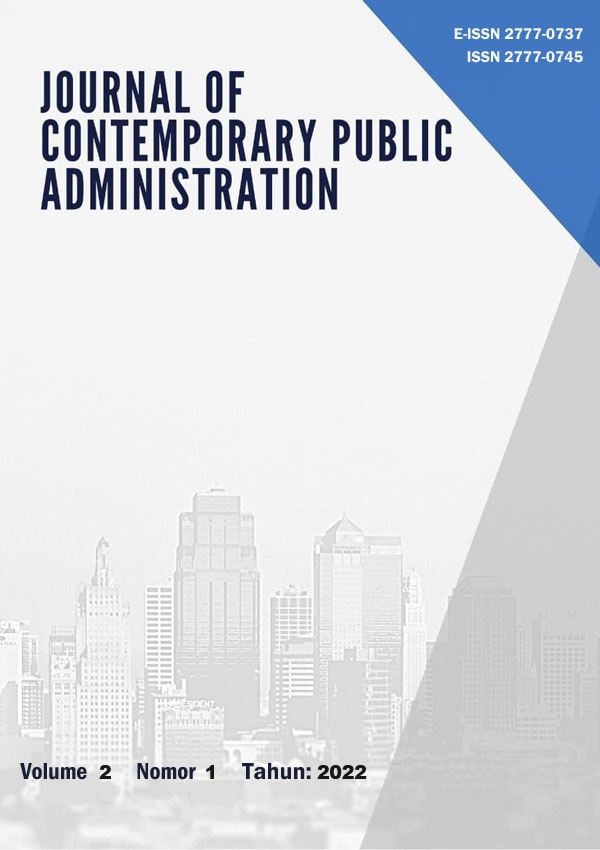Implementasi Nilai Tri Hita Karana dalam Kebijakan Penanganan Pandemi Covid-19 di Provinsi Bali
Abstract
The global health crisis due to the Covid-19 pandemic has an impact on various lines of life. This problem requires a solution in acting and responding to the challenges faced, one of them is through policy. Various government products in the form of public policy have been presented to respond to the rapidly growing pandemic. To maximize the policy performance, it is necessary to actualize the values of local wisdom to participate in the form of synergies to overcome the problems of society. Cultivating value that flourish in the community is prominent to be applied for policies to strengthen community resilience and optimize policy implementation. The value of life that arises in the community is an effort to attain policy effectiveness in dealing with challenges and obstacles due to the Covid-19 pandemic. The method used in this study uses a qualitative descriptive approach. The data collection technique used by a literature study with a research focus to describe and analyze the philosophical values of Tri Hita Karana in regional policies as a form of civilizing local wisdom. The results of this study indicate that policy instruments in answering problems must be able to revive the values ​​that exist in the society. The form of dissemination between policies and local wisdom values becomes a symbiosis that supports each other and can establish a more adaptive ecosystem and answer the challenges faced by local communities. The implementation of the Gotong Royong Task Force (Satgas) policy based on Traditional Villages in Bali by integrating the philosophical values of Tri Hita Karana has been able to respond the neccesities of the local community in dealing with the COVID-19 pandemic and is a form of cultivating the Tri Hita Karana values that are implementable and inherit the values of the Tri Hita Karana local wisdom for future generations.
References
Alexander, T. M., (2010). Eros and Spirit: Toward a Humanistic Philosophy of Culture. The Pluralist, 5(2), 18–44. https://doi.org/10.5406/pluralist.5.2.0018
Ardana, I. (2012). SEKALA NISKALA: Realitas Kehidupan Dalam Dimensi Rwa Bhineda. Dewa Ruci Jurnal Pengkajian dan Penciptaan Seni, (8)1, 139-156. https://doi.org/10.33153/dewaruci.v8i1.1097
Buttery, T. (2012). Tri Hita Karana. CSPA Quarterly, 7, 10–13. http://www.jstor.org/stable/cspaquarterly.7.0010
Dunn, W. N. (2003). Pengantar Analisis Kebijakan Publik. Yogyakarta: Gadjah mada University Press.
Hook, S. (1970). Philosophy and Public Policy. The Journal of Philosophy, 67(14), 461–470. https://doi.org/10.2307/2024107
Kusumanegara, S. (2010). Model dan Aktor dalam Proses Kebijakan Publik. Yogyakarta: Gava Media.
Pandet, I. W,. & Khrisna, I. B. W. (2018). Falsafah Hidup dalam Konsep Tri Hita Karana. Genta Hredaya. Jurnal Sekolah Tinggi Agama Hindu Negeri Mpu Kuturan Singaraja. 2(2). Retrieved from https://stahnmpukuturan.ac.id/jurnal/index.php/genta/article/view/455
Pembetukan Satuan Tugas Gotong Royong Penanganan Covid-19 berbasis Desa Adat di Bali melalui Keputusan bersama Gubernur Bali dan Bandesa Agung Majelis Desa Adat Provinsi Bali;
Putri, K., & Permana, I. P. A. (2022). Contextualization of Pancasila in The Regional’s Policy to Overcome the Covid-19 in Bali. Digital Press Social Sciences and Humanities, 8. https://doi.org/10.29037/digitalpress.48418
Suacana, I. W. G., Wiratmaja, I. N., & Sudana, I. W. (2022). Local Wisdom Tri Hita Karana and Based on Indigenous Communities in Bali. Budapest International Research and Critics Institute-Journal (birci-Jourbal). 5(2), 10331-10342. Retrieved from https://www.bircu-journal.com/index.php/birci/article/view/4832
Sudiarta, I. W. (2021). Konsep Tri Hita Karana Dalam Pelaksanaan Pariwisata Budaya Hindu. Cultoure Jurnal Ilmiah Pariwisata Budaya Hindu, 2(1), 12-23. Retrieved from https://jurnal.stahnmpukuturan.ac.id/index.php/cultoure/article/view/1179
Suryawan, I. N. (2020). Desa Mawacara, Negara Mawatata: Bali's Customory Village Based State Policies in the Time of the Covid-19 Pandemic. Jurnal Politik, 6(1), 39-66. Reterieved from http://jurnalpolitik.ui.ac.id/index.php/jp/article/view/328
 Abstract viewed = 368 times
Abstract viewed = 368 times
 PDF (Bahasa Indonesia) downloaded = 806 times
PDF (Bahasa Indonesia) downloaded = 806 times







1.png)



